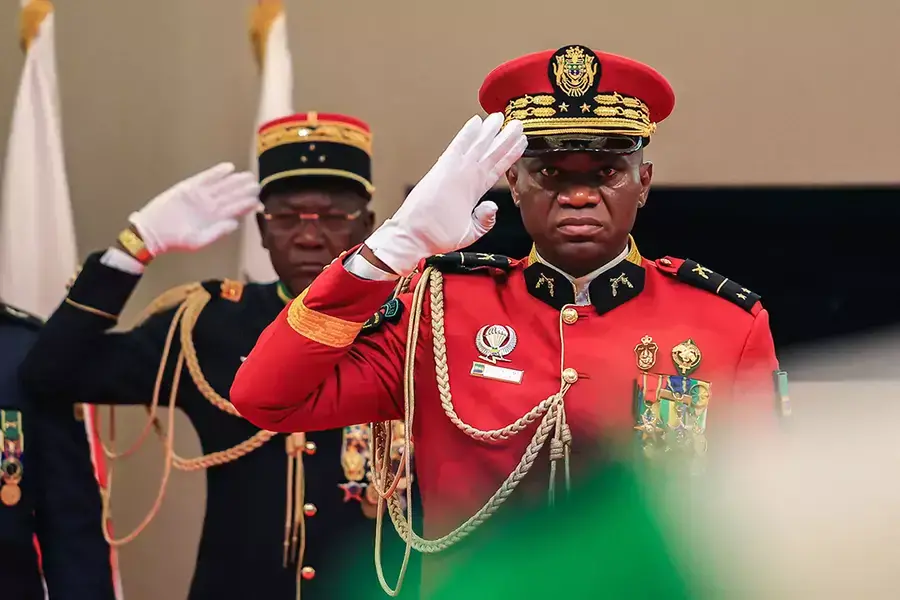Gabon’s Balancing Act

With just over four months in power, Gabon’s junta leader and transitional President Gen. Brice Oligui Nguema recently concluded a dizzying diplomatic tour; attending global summits such as COP28 and the Saudi Arabia-Africa summit, hosting representatives from France, the United Kingdom, and the United States, and meeting with neighboring presidents and heads of African regional organizations. Posting these engagements prolifically on social media, Gen. Nguema has worked to both justify his government’s August 2023 coup d’état and allay fears that he plans to hold on to power indefinitely.
While many coup leaders seek legitimacy via external recognition (recent tours of Sudan’s warring generals come to mind), Gen. Nguema’s tactics are notable for two reasons. First, his public actions indicate a remarkable difference between Gabon’s coup aftermath and its Sahelian counterparts, which are regularly lumped together in the popular “coup contagion” narrative. While the Sahel’s junta leaders of Burkina Faso, Niger, Guinea, and Mali have largely isolated themselves from regional organizations like the Economic Community of West African States (ECOWAS), and often disparage international institutions, democracy, and the West, Gen. Nguema has sought out a wide array of partners and called on them to re-admit Gabon to global institutions. He has argued repeatedly that his actions will preserve and improve the country’s democracy, “reorganizing [institutions] in order to make them more democratic and more in line with international standards... for human rights, fundamental freedoms, democracy and the rule of law.”
More on:
At the same time, Nguema has focused on strengthening relations and lobbying for readmission with members of the Economic Community of Central African States (ECCAS), which is more a dictators’ club than bastion of democratic principles. The ECCAS suspended Gabon’s membership and announced plans to move the organization’s headquarters from Libreville in the aftermath of the coup d’état. Since September of last year, Nguema has met with a president or representative from every ECCAS member state except Angola.
His meetings with ECCAS members reveal the complicated balancing act Gabon’s junta is attempting with its foreign policy. On one hand, it is arguing on behalf of democracy and in defense of free and fair elections to justify the coup d’état, on the other, it is working to pacify the neighboring “dinosaur regimes,” many of which fit the same criterion for a coup d’état as Gabon in August. In the wake of Gabon’s coup, several of these same presidents implemented additional coup-proofing measures to protect their own regimes from the same fate. In Rwanda, President Paul Kagame reportedly retired several high-ranking generals in the armed forces, while senior officials in Cameroon’s government have threatened legal action against social media users and journalists who “speculate” on a coup d’état publicly.
Gen. Nguema has been relatively successful in his efforts to navigate this tricky situation, often by playing to egos, saying things such as, “it is important to meet the elders” of the region; or, in a separate meeting with President Denis Sassou Nguesso of the Republic of Congo, "I have come to consult, to discuss, to exchange with (the president), who for us is a key in the region, who can relay to global authorities what we have done.” At other points, he has emphasized that the military prevented a far bloodier overthrow from opposition groups, and thus acted to maintain constitutional order and stability in the region.
Nowhere were these contradictions more apparent than his visit to Cameroon. While Gen. Nguema promoted his meeting with President Paul Biya with genial photos and a description of “warmth and conviviality;” he later met with Gabonese in Yaoundé, and justified the coup with the fact that “citizens remained poor” after fifty-six years of Bongo rule. With Biya himself in power for forty-one years and maneuvering for his son to follow, it is difficult to see how the comparisons to Gabon’s Bongo dynasty could be avoided.
Thus far, Gabon’s strategy has shown mixed results. In November, the African Development Bank reversed its financial sanctions on Gabon following negotiations with the new government. In December, ECCAS announced that it would maintain Gabon’s suspension until constitutional order was restored, though the bloc notably praised the “peaceful and inclusive” nature of the coup and reversed the decision to move its headquarters to Malabo. While this could point to eventual readmission, ECCAS leaders undoubtedly remain skittish about setting a precedent for recognizing coups d’état in the region.
More on:
In the coming months, it will be interesting to see how long Gabon’s leadership can continue playing all sides, particularly if pressure for a return to civilian rule mounts, or in the case of another coup d’état within the ECCAS bloc. But in search of recognition from so many different parties, and in dealing with a regional bloc that is more often used to uphold regimes than promote accountability, Gabon’s junta may be forced to learn the hard way that “a friend to all is a friend to none.”
 Online Store
Online Store